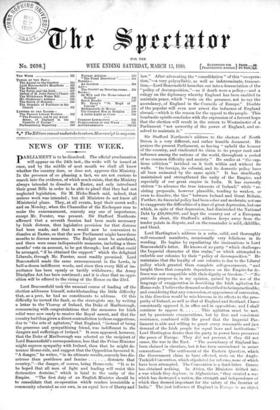Lord Beaconsfield took the unusual course of leading off the
election addresses himself, notwithstanding the little difficulty that, as a peer, he had no constituents to address. Of this difficulty he turned the flank, as the strategists say, by writing a letter to the Viceroy of Ireland, the Duke of Marlborough, commencing with congratulations that the measures for Irish relief were now ready to receive the Royal assent, and that the country had thus given a direct contradiction to those suggestions, due to " the arts of agitators," that England, "instead of being the generous and sympathising friend, was indifferent to the dangers and sufferings of Ireland." It soon appeared, however, that the Duke of Marlborough was selected as the recipient of Lord Beaconsfield's correspondence, less that the Prime Minister might express sympathy with Ireland, than that he might de- nounce Home-rule, and suggest that the Opposition favoured it. "A danger," he writes, " iu its ultimate results, scarcely less dis-
astrous than pestilence and famine distracts that country,"—the danger, of course, being Home-rule. "It is to be hoped that all men of light and leading will resist this destructive doctrine," which is fatal to the unity of the Empire. " The first duty of an English Minister should be to consolidate that co-operation which renders irresistible a community educated as our own, in an equal love of liberty and law." After advocating the " consolidation " of this " co-opera- tion,"—a very polysyllabic, as well as indeterminate, transac- tion,—Lord Beaconsfield launches out into a denunciation of the "policy of decomposition,"—as if death were a policy,—and a eulogy on the diplomacy whereby England has been enabled to maintain peace, which "rests on the presence, not to say the ascendancy, of England in the Councils of Europe." Doubts of the popular will even now arrest the influence of England abroad,—which is the reason for the appeal to the people. This bombastic epistle concludes with the expression of a fervent hope that the election will result in the return to Westminster of a Parliament "not unworthy of the power of England, and re- solved to maintain it."


































